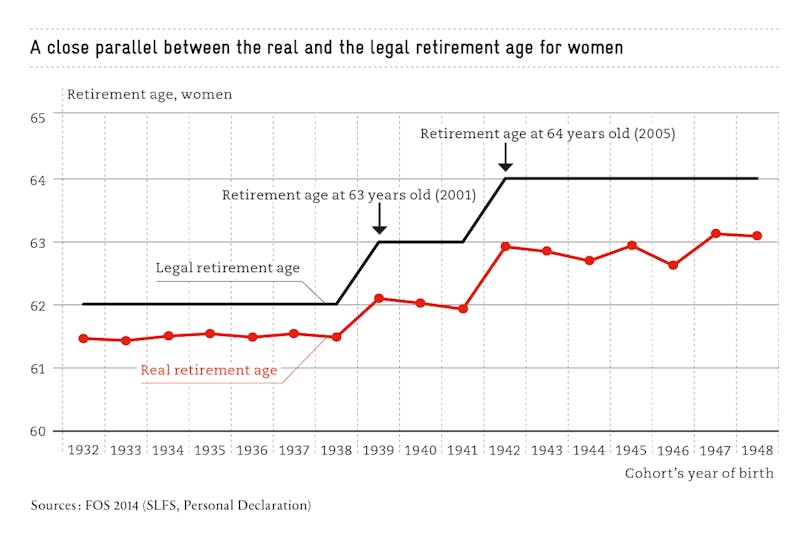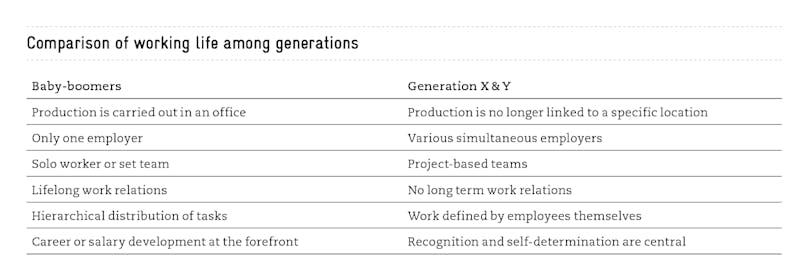When Swiss media cover the labor market, there are usually two dominant and conflicting, even contradictory, points of view. On one hand, there is a certain fear that technological progress will indubitably cause the suppression of employments. On the other, many companies complain about the persistent shortage of qualified labor force, which could potentially get worse as the baby-boomer generation starts to retire. So what is really going on ?
Let’s look back at some facts. Ten years ago, fewer than 10% of Swiss companies found it difficult to recruit employees. By the end of 2016, 18% of Swiss companies were finding it difficult to hire highly qualified individuals; 16% specifically complained about the lack of university graduates. The economic and professional associations have recently announced that they find it extremely hard to get a hold of engineers. But there is more to the equation than simply hiring specialists. The overall rate of employed people is currently hitting a record: in 2016, just over two out of every three people actively participate in the labor market. This proportion has increased by 1.4% in the past 20 years, despite a growing number of pensioners. With an employment rate of the working-age population (ages 15 to 64) above 4.2%, the wave of retirements is more than counterbalanced.

First of all, this can be explained by an increase of women participating in the labor market; this has been achieved thanks to a better balance between work and home, but also because of the rise in the average age at which women have their first child. The increase of the legal age of retirement has also had a positive impact on the employment rate in women. Furthermore, there is also the question of immigration. Since 1997, one million jobs have been created in Switzerland, of which half have been assigned to foreigners. Globally, the active population in Switzerland has increased by more than a quarter over the past 20 years. This is quite a remarkable performance.
These points do not really support the theory of endangered human employments. Whoever persists in believing that machines and robots will eventually replace the job of a human being, should perhaps be more wary of other human beings ? Who better than a human being to substitute another human being? Recent developments in Switzerland (and even further back in time), have proven that there isn’t a fixed volume of work that needs to be distributed. On the contrary : more employments generate more revenues, which in turn, create an increased demand for labor. To a certain extent, work generates more work.

Notwithstanding, the positive work dynamics of the Swiss labor market should not be taken for granted – regardless of the presence, or not, of an aging population. The amount of long term unemployed people, in relation with the total number of unemployed people, is in constant progression. This may indicate a growing inadequacy between the skills looked for and the skills supplied. Older workers are more concerned by this phenomenon, as they generally tend to be more specialized.
Over the past few years, the so-called Accompanying Measures (AM) for Free Movement of Persons, have harmed the course of the labor market. Because of the AM, the amount of Collective Labor Regulations that have been forcibly declared mandatory, have considerably increased. Minimal wages, which are part of these conventions, make it harder to integrate young professionals as well as less qualified employees, into the labor market, and additionally, push towards automation and relocation. Furthermore, by setting a salary gradation – similar to the remuneration scale used in the public sector – which increases with the number of years of experience, an additional obstacle is inserted, making it harder to reintegrate older workers into the labor market; so much so, that they have no chance when competing with less experienced candidates.
In the future, the main challenge for the Swiss labor market will not be whether or not enough positions or functions can be created. With or without robots, there will always be work available. It will be more a question of ensuring adequate investment in education and professional training, as well as maintaining the flexibility of the Swiss labor market.
Digitalization, even though it is important, it is not the only source of structural change. Additionally, it will not challenge the Swiss labor market unless some deep changes occur beforehand. The signs of these changes are already visible : the time spent in the same company has (slightly) decreased among the younger generation and working for various employers simultaneously is no longer a strange thing. Gradually, innovative and further flexible working models start to surface. Thanks to technology, production is no longer linked to a single location, and work teams are also constituted on a more ad hoc basis – intermittently – for a given project.
These changes alarm the trade unions, who consider that these flexible working models lead to precarious employment conditions. But they are mistaken : the autonomous management of one’s own agenda offers more advantages to employees than to employers. The latter generally prefer fixed working hours; on one hand, they can control and coordinate their collaborators more efficiently and on the other, companies are often expected to keep opening hours or ensure a fixed presence. Undoubtedly, Uber and other «shared economy» platforms do not necessarily offer the greatest long term career perspectives. Nevertheless, they do represent an important supplement, in particular for younger people and those less well off.
Adjustments are also expected on behalf of the companies. The loyalty of their employees is not guaranteed. Many young people today openly avoid full time positions. They increasingly want to have a say regarding the content of their work. Contrary to baby-boomers, their personal imprint is of great importance for the younger Generation ; as can be seen with their fascination for start-ups and cult figures such as Elon Musk or Steve Jobs. To achieve this, they are ready to give up security and guaranteed salary raises; or at least partially.





